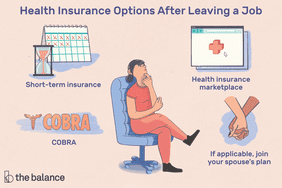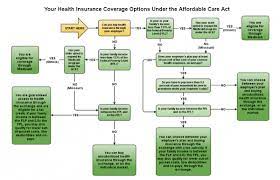After leaving a job, individuals can get health insurance through COBRA, a spouse’s plan, or the Health Insurance Marketplace. Understanding these options is crucial for finding the right coverage.
In this guide, we will explore various health insurance options after leaving a job, break down their pros and cons, and provide actionable steps to ensure you have coverage.
The Importance of Health Insurance:

- Financial Protection: Health insurance protects individuals and families from high medical costs, ensuring they can access necessary treatments without facing significant financial hardship.
- Access to Quality Care: Having health insurance increases access to a network of healthcare providers, allowing for timely medical attention, preventive care, and specialized treatments.
- Preventive Services: Many health insurance plans cover preventive services at no additional cost, including vaccinations, screenings, and annual check-ups, which help in early detection and management of health issues.
- Management of Chronic Conditions: Health insurance provides essential coverage for managing chronic illnesses, ensuring ongoing access to necessary medications and regular healthcare services.
- Peace of Mind: Knowing that you have health insurance offers peace of mind, reducing stress related to unexpected medical expenses and allowing individuals to focus on their health and well-being.
Concerns After Leaving Employer-Sponsored Health Insurance:
Leaving employer-sponsored health insurance raises several concerns for individuals and families. One major worry is the potential loss of comprehensive coverage, which can lead to high out-of-pocket costs for medical care. Additionally, navigating new insurance options, like COBRA or marketplace plans, can be confusing and overwhelming. Individuals may also fear financial strain due to higher premiums or deductibles, and the limited enrollment periods can create stress around securing timely coverage.
Understanding Health Insurance Options After Leaving a Job:
Losing or leaving a job can be a stressful time, especially when it comes to figuring out health insurance options. However, there are several alternatives available to help maintain coverage during this transition period. Below are some key health insurance options to consider after leaving a job:
COBRA Coverage:
The Consolidated Omnibus Budget Reconciliation Act (COBRA) enables you to keep your employer-sponsored health insurance. for up to 18 months (or longer in some cases) after leaving your job. While COBRA maintains the same coverage, you will be responsible for the full premium, which includes both your portion and the employer’s contribution. This can make COBRA more expensive than employer-subsidized insurance, but it offers the advantage of uninterrupted coverage.
Also read: Can I Health Care Provider Be A Psychaist – A Complete Guide!
Spouse’s Health Insurance Plan:
If your spouse or domestic partner has employer-sponsored health insurance, you may be eligible to join their plan. Most employers allow spouses to be added during a special enrollment period triggered by job loss. This can be a more affordable option than COBRA, as your spouse’s employer might cover a portion of the premium.
Understanding the Health Insurance Marketplace:
Another option is to explore the Health Insurance Marketplace (or exchange), where you can purchase individual or family health insurance plans. If you lose job-based insurance, you qualify for a special enrollment period, allowing you to sign up outside the regular enrollment period. Depending on your income, you may also be eligible for subsidies or tax credits, making marketplace plans more affordable.
Medicaid:
For those with low income, Medicaid is a state and federally funded health insurance program that provides free or low-cost coverage. Eligibility for Medicaid is based on your income and household size. After leaving a job, if your income significantly decreases, you may qualify for Medicaid, which provides comprehensive coverage at little to no cost.
Short-Term Health Insurance:

Short-term health insurance plans offer temporary coverage for gaps between jobs. These plans are typically more affordable than traditional health insurance, but they may not cover pre-existing conditions or offer comprehensive benefits. Short-term plans are best for those who are healthy and need minimal coverage for a brief period.
Freelancer or Self-Employed Insurance Plans:
If you’re leaving your job to become self-employed or freelance, you can explore insurance plans designed for independent workers. Many organizations, like Freelancers Union or industry-specific associations, offer health insurance options that cater to freelancers or self-employed individuals. These plans often provide coverage similar to what you’d receive through an employer.
Medicare (If Eligible):
If you are 65 or older, or if you qualify due to a disability, you can enroll in Medicare, a federal health insurance program. Medicare provides comprehensive health insurance for older adults and certain individuals with disabilities, and you can sign up during a special enrollment period after leaving employer-sponsored coverage.
Option 2: Health Insurance Marketplace (Special Enrollment Period)
When you leave your job and lose your employer-sponsored health insurance, one of the best alternatives is to enroll in a health plan through the Health Insurance Marketplace. By doing so, you may qualify for a Special Enrollment Period (SEP), which gives you a 60-day window to sign up for health insurance outside of the regular open enrollment period.
Also read: Do You Use Health Insurance For Physical Therapy – A Complete Guide!
How Special Enrollment Works:
The Special Enrollment Period is triggered when you experience certain life events, such as losing your job-based health insurance, getting married, having a child, or moving to a new area. If you qualify, you can browse and enroll in a health insurance plan through the Marketplace without waiting for the annual open enrollment. This is especially useful for those who need to maintain health coverage after leaving a job.
Advantages of Utilizing the Health Insurance Marketplace:
Access to a Variety of Plans:
The Health Insurance Marketplace provides access to a broad range of health plans, organized into tiers based on their cost and coverage—bronze, silver, gold, and platinum. Each tier varies in premium costs, deductibles, and out-of-pocket expenses, giving you the flexibility to choose a plan that fits your healthcare needs and budget. Whether you’re looking for more affordable coverage or plans with lower deductibles, the Marketplace offers choices.
Financial Assistance through Subsidies:

One of the biggest advantages of enrolling through the Marketplace is the potential for financial help. Depending on your income, you may qualify for premium tax credits and subsidies, which lower the cost of your monthly premiums. Additionally, some individuals qualify for cost-sharing reductions, further reducing out-of-pocket costs such as copayments and deductibles. This makes Marketplace coverage more affordable for many people, especially those who are transitioning from employment.
Complete Health Insurance Benefits:
Marketplace plans are required to cover a set of essential health benefits, including preventive care, hospitalization, prescription drugs, mental health services, and maternity care. This means that even after losing your job-based insurance, you can still get comprehensive coverage for all your healthcare needs. Whether it’s routine doctor visits or emergency care, these plans ensure you’re well-protected.
No Pre-Existing Condition Exclusions:
A key feature of Marketplace insurance is that it cannot deny you coverage or charge higher premiums based on pre-existing conditions. This guarantees that no matter your health status, you have access to quality health insurance, even if you’re between jobs.
Also read: What Are Important Aspects Of Your Health – A Complete Guide!
FAQs
What is COBRA?
COBRA allows individuals to continue their employer-sponsored health insurance for up to 18 months after leaving a job, but they must pay the full premium.
Am I Eligible to Join My Spouse’s Health Insurance Plan?
Yes, if your spouse has employer-sponsored insurance, you can often join their plan during a special enrollment period triggered by your job loss.
What is the Health Insurance Marketplace?
The Marketplace is an online platform where you can compare and purchase health insurance plans, especially beneficial after losing job-based coverage.
How does Medicaid work after losing a job?
Medicaid provides low-cost or free health coverage based on income. If your income decreases significantly after leaving your job, you may qualify for this program.
What is short-term health insurance?
Short-term health insurance offers temporary coverage for gaps between jobs but may not cover pre-existing conditions or provide comprehensive benefits.
Conclusion
In conclusion, after leaving a job, it is essential to explore various health insurance options, such as COBRA, spouse’s plans, and the Health Insurance Marketplace, to ensure continuous coverage. Each option has its benefits and drawbacks, making it crucial to assess your personal circumstances and financial situation. By understanding these choices, individuals can secure the health insurance they need during their transition.




